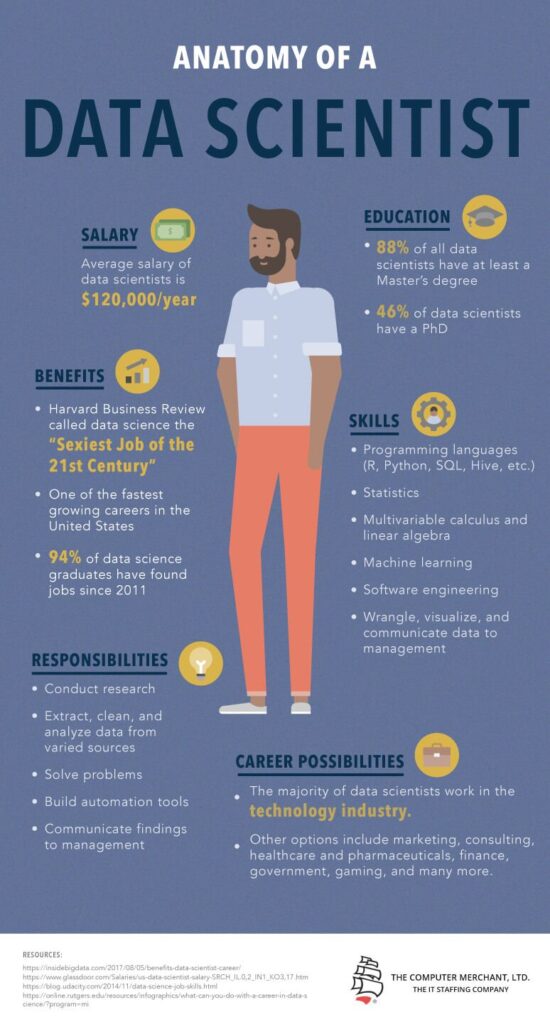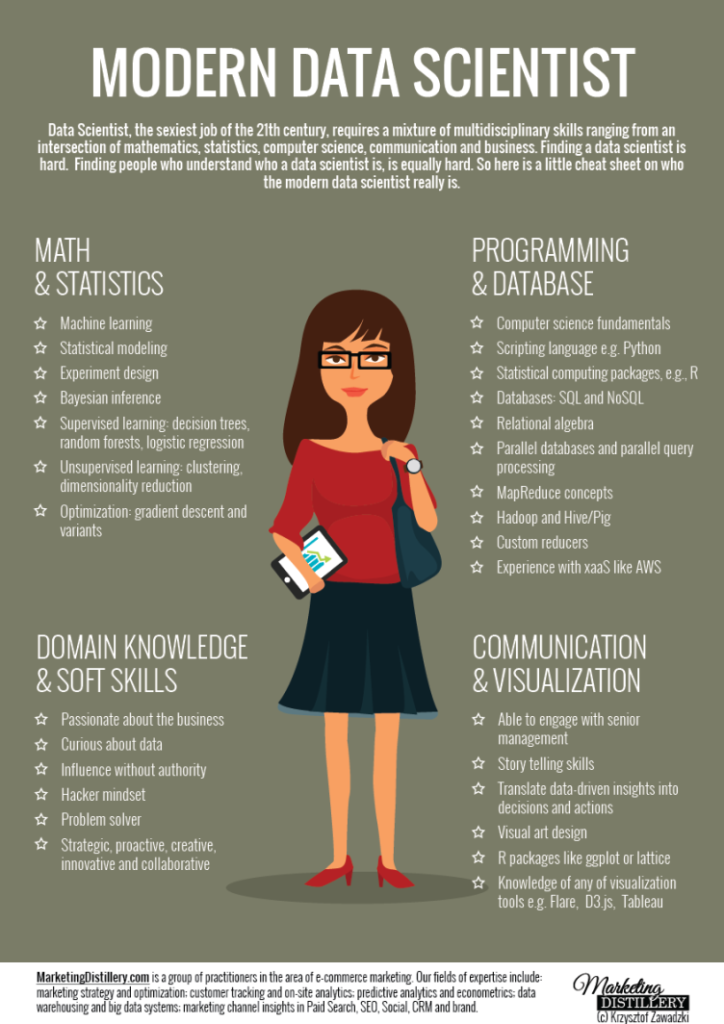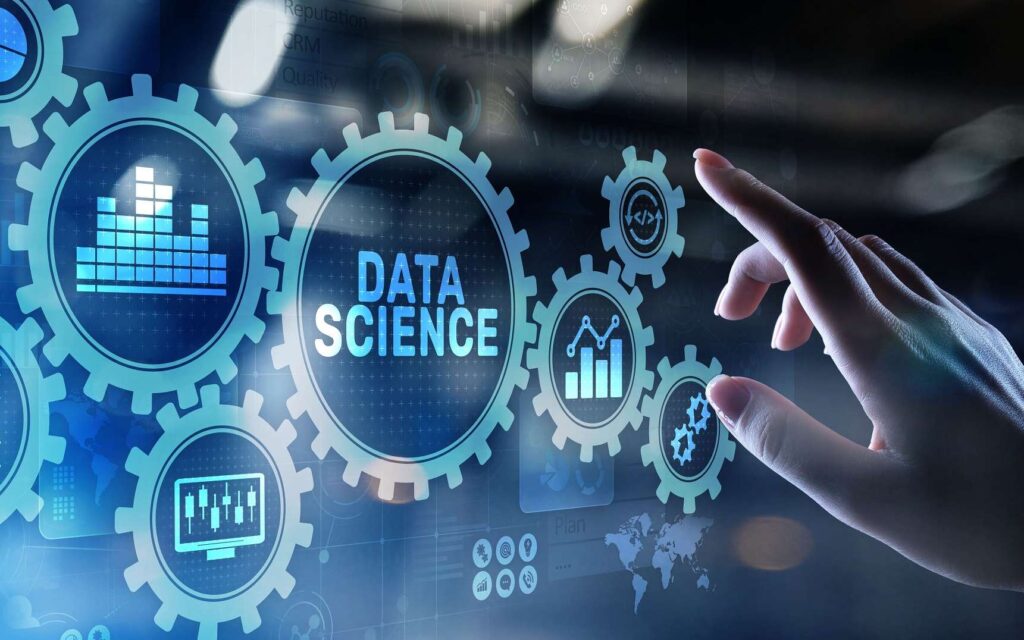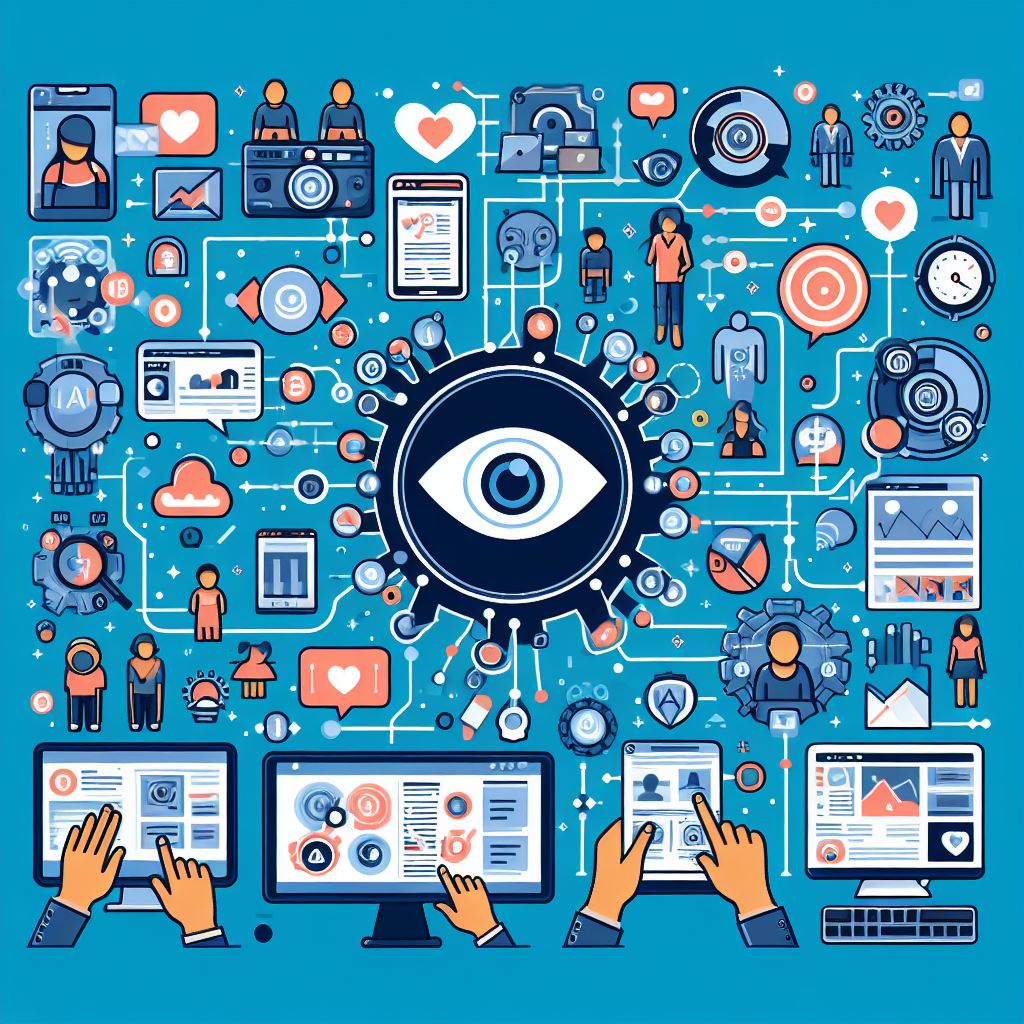Data science has become an essential requirement in today’s world, driving informed decision-making and solving business challenges. It is a versatile field that transcends industry boundaries, allowing the skills and knowledge gained to be applied across various domains. I have successfully managed projects that leverage data science techniques to extract key performance indicators (KPIs) and deliver significant business value. The implementation of interactive dashboards and insightful reports has proven instrumental in generating substantial cost savings and driving tangible outcomes.
Introduction
Data science is an exciting and rapidly growing field that involves extracting insights and knowledge from large amounts of structured and unstructured data. It combines elements of mathematics, statistics, computer science, and domain expertise to analyze and interpret complex data sets.
Here are some key points to consider about data science as a career:
- Growing demand: The demand for data scientists is consistently increasing across industries. Companies are recognizing the value of data-driven decision-making and are seeking professionals who can help them extract meaningful insights from their data.
- Diverse applications: Data science finds applications in various domains, including finance, healthcare, e-commerce, marketing, social media analysis, and more. This diversity allows data scientists to work on a wide range of interesting and impactful projects.
- Lucrative salaries: Data science is known for offering competitive salaries. Due to the high demand and scarcity of skilled professionals, data scientists often receive attractive compensation packages.
- Continuous learning: Data science is an ever-evolving field. There are always new techniques, tools, and technologies emerging, which means that continuous learning is crucial to stay up to date. This aspect can be both challenging and exciting, as it provides opportunities for personal and professional growth.
- Technical skills: Data scientists typically need a strong foundation in mathematics, statistics, and programming. Proficiency in languages like Python or R, as well as knowledge of data manipulation, machine learning, and data visualization, is essential.
- Interdisciplinary nature: Data science often involves collaboration with professionals from various backgrounds, such as business analysts, domain experts, and software engineers. Effective communication and the ability to translate technical findings into actionable insights are valuable skills for a data scientist.
- Ethical considerations: Data scientists work with sensitive information and face ethical challenges related to data privacy, bias, and fairness. It’s important for data scientists to be aware of these issues and adopt responsible practices to ensure the ethical use of data.
Education for data science
In order to pursue a career in data science, it is important to focus on education. Here’s a simplified education journey to pursue a career in data science:
- Secondary School Education:
- Focus on core subjects like mathematics, statistics, and computer science.
- Participate in relevant extracurricular activities or competitions.
- Develop a strong foundation in critical thinking and problem-solving skills.
- Undergraduate Degree:
- Pursue a bachelor’s degree in data science, computer science, mathematics, statistics, or a related field.
- Take courses in programming, statistics, machine learning, data visualization, and database management.
- Engage in projects or internships to gain practical experience.
- Master’s Degree (Optional):
- Consider pursuing a master’s degree in data science, analytics, or a specialized field within data science.
- Deepen your knowledge in advanced data analysis, algorithms, predictive modeling, and domain-specific applications.
- Work on research projects or internships to gain specialized expertise.
- Continuous Learning and Professional Development:
- Engage in online courses, workshops, or certifications to stay updated with the latest tools, techniques, and trends in data science.
- Participate in data science competitions or hackathons to apply your skills and learn from industry experts.
- Attend conferences, webinars, and industry events to network and learn from professionals in the field.
Learning resources for data science
Some of the best resources for learning data science. These resources include online courses, tutorials, books, and platforms that cover a wide range of data science topics and cater to different learning preferences:
| Resource | Description |
|---|---|
| Coursera | Online platform offering data science courses from top universities |
| edX | Provides courses on data science, machine learning, and statistics |
| Kaggle | Community-driven platform with datasets, competitions, and tutorials |
| DataCamp | Offers interactive courses on data science and machine learning |
| Towards Data Science | Online publication with articles, tutorials, and case studies |
| Python for Data Analysis | Book by Wes McKinney, focusing on data manipulation with pandas. |
| The Elements of Statistical Learning | Book on machine learning by Hastie, Tibshirani, and Friedman |
| YouTube | Channels like “DataCamp” and “sentdex” offer data science tutorials. |
| Udemy | Provides a wide range of data science courses by various instructors. |
| R for Data Science | Online book by Hadley Wickham and Garrett Grolemund on using R. |
These resources offer a combination of theoretical knowledge, practical exercises, and real-world examples to help you learn and apply data science concepts effectively. It’s recommended to explore multiple resources and tailor your learning path to your specific interests and goals. Additionally, staying updated with research papers, attending conferences, and participating in data science communities can further enhance your learning journey.
Steps to pursue a career in data science
To pursue a career in data science, here are some steps you can take:
- Develop a strong foundation in mathematics and statistics: Data science heavily relies on mathematical and statistical concepts. Familiarize yourself with subjects such as linear algebra, calculus, probability, and statistical analysis.
- Gain programming skills: Programming is essential in data science. Start by learning a programming language commonly used in data science, such as Python or R. Understand the fundamentals of programming and practice implementing data manipulation and analysis tasks.
- Learn data manipulation and analysis techniques: Data manipulation and analysis are core skills in data science. Become proficient in using libraries and tools like pandas, NumPy, SQL, and data visualization libraries such as Matplotlib and Seaborn.
- Study machine learning: Machine learning is a key aspect of data science. Familiarize yourself with various machine learning algorithms, both supervised and unsupervised. Understand how to train models, evaluate their performance, and make predictions using libraries like scikit-learn or TensorFlow.
- Work on projects: Practical experience is crucial in data science. Undertake projects that involve real-world data sets and problem-solving. This will help you apply your skills and build a portfolio of work that demonstrates your abilities to potential employers.
- Pursue formal education or online courses: Consider earning a degree in a field related to data science, such as computer science, mathematics, statistics, or data science itself. Alternatively, there are numerous online courses, tutorials, and bootcamps that can provide structured learning and certification in data science.
- Participate in Kaggle competitions and data science challenges: Kaggle is a platform where you can compete and collaborate on data science projects. Participating in Kaggle competitions allows you to practice your skills, learn from others, and showcase your abilities.
- Network and join data science communities: Engage with other data science professionals and enthusiasts by joining online communities, attending conferences, or participating in local meetups. Networking can lead to valuable connections, mentorship opportunities, and exposure to the latest trends in the field.
- Continuously learn and stay updated: Data science is a rapidly evolving field. Stay updated with the latest advancements, new tools, and techniques. Follow blogs, read research papers, and explore online resources to keep expanding your knowledge.
- Gain practical experience through internships or work on real-world projects: Internships or work experience in data-related roles can provide valuable industry exposure and enhance your understanding of data science in practice. Look for opportunities to work on projects in companies or research institutions.
Education completed – what next?
After learning data science, there are several steps you can take to further advance your career and apply your knowledge effectively:
- Build a portfolio: Create a portfolio of data science projects that demonstrate your skills and expertise. Include projects that showcase a variety of techniques and problem domains. This portfolio will be valuable when applying for jobs and showcasing your capabilities to potential employers.
- Apply for data science positions: Start applying for data science positions in companies or organizations that align with your interests and career goals. Tailor your resume to highlight your relevant skills, projects, and experience. Leverage online job boards, professional networks, and data science communities to find suitable job opportunities.
- Prepare for interviews: Study common interview questions for data science positions and practice your responses. Be prepared to demonstrate your technical skills, problem-solving abilities, and knowledge of data science concepts. Brush up on statistics, machine learning algorithms, and data manipulation techniques.
- Continuously learn and update your skills: Data science is a rapidly evolving field, so it’s important to stay updated with the latest advancements, tools, and techniques. Explore new libraries, frameworks, and methodologies. Enroll in online courses, attend webinars, and participate in workshops to keep expanding your skill set.
- Gain practical experience: Seek opportunities to gain practical experience through internships, co-op programs, or freelance projects. Practical experience will enhance your understanding of real-world data challenges and help you build a stronger professional network.
- Collaborate and network: Engage with other data science professionals and join relevant communities and forums. Collaborate on open-source projects, contribute to data science competitions, and attend conferences and meetups. Networking can lead to valuable connections, mentorship opportunities, and potential job referrals.
- Specialize in a specific area: Consider specializing in a particular domain or subfield within data science that interests you. This could be natural language processing, computer vision, deep learning, or a specific industry like finance or healthcare. Developing expertise in a niche area can make you stand out and open up specialized career opportunities.
- Stay updated with ethical considerations: As a data scientist, it’s crucial to be aware of ethical considerations related to data privacy, fairness, and bias. Stay informed about emerging regulations and best practices in the field. Incorporate responsible data practices into your work and advocate for ethical data use.
- Continue learning through advanced degrees: If you’re interested in furthering your education, consider pursuing advanced degrees such as a master’s or Ph.D. in data science, computer science, or a related field. Higher degrees can provide deeper theoretical knowledge and open doors to research or academic positions.
- Embrace lifelong learning: Data science is a field that requires continuous learning and adaptation. Embrace a mindset of lifelong learning and continuously seek opportunities to enhance your skills, stay updated with industry trends, and explore new areas within data science.


Role of a data scientist
The role of a data scientist is multifaceted and typically involves a range of responsibilities related to extracting insights and knowledge from data. Here are some key aspects of a data scientist’s role:
- Data analysis and exploration: Data scientists work with large and complex data sets, exploring and analyzing them to identify patterns, trends, and relationships. They use statistical techniques, visualization tools, and exploratory data analysis to gain a deep understanding of the data.
- Developing and implementing models: Data scientists build and deploy models that can uncover insights, make predictions, or automate decision-making processes. This involves selecting appropriate algorithms, training models using machine learning techniques, and evaluating their performance.
- Machine learning and predictive modeling: Data scientists employ machine learning algorithms to develop predictive models. They work with supervised learning techniques (classification and regression) and unsupervised learning techniques (clustering and dimensionality reduction) to create models that can make accurate predictions or identify patterns in the data.
- Data preprocessing and feature engineering: Data scientists clean and preprocess raw data to remove noise, handle missing values, and standardize formats. They also perform feature engineering, which involves transforming and selecting relevant features from the data to improve model performance.
- Experimentation and hypothesis testing: Data scientists design and conduct experiments to validate hypotheses or test the effectiveness of models. They establish experimental frameworks, collect data, perform statistical analyses, and draw meaningful conclusions from the results.
- Data visualization and communication: Data scientists are skilled at visualizing data and presenting complex findings in a clear and meaningful way. They use data visualization techniques to communicate insights and results to stakeholders, enabling them to make informed decisions.
- Collaboration and interdisciplinary work: Data scientists often collaborate with cross-functional teams, including business analysts, domain experts, and software engineers. They work together to understand business requirements, translate them into data problems, and develop solutions that address specific objectives.
- Data-driven decision-making: Data scientists play a critical role in helping organizations make data-driven decisions. They provide insights, recommendations, and predictions based on their analyses, models, and understanding of the data.
- Continual learning and staying updated: Data science is a fast-evolving field, and data scientists must stay updated with the latest tools, techniques, and research. They continuously learn new algorithms, methodologies, and technologies to enhance their skills and remain at the forefront of the field.
It’s important to note that the specific role and responsibilities of a data scientist can vary depending on the industry, organization, and the specific project at hand. However, the core objective remains the same: to extract value and insights from data to drive informed decision-making and solve complex problems.
Top 5 countries employing data scientists
Here’s a table showcasing the top 5 countries known for employing data scientists. Please note that the numbers provided are approximate and may vary over time.
| Rank | Country | Approximate Number of Data Scientists Employed |
|---|---|---|
| 1 | United States | Several hundred thousand |
| 2 | India | Tens of thousands |
| 3 | United Kingdom | Tens of thousands |
| 4 | Germany | Tens of thousands |
| 5 | Canada | Tens of thousands |
It’s important to note that the field of data science is constantly evolving, and demand for data scientists may vary in different regions and industries. This table represents a general overview of countries with a significant presence of data scientists in their job markets.
Industries employing data scientists
Refer table below listing some industries where data science is commonly used. Please note that data science has applications in various sectors, and this table provides a general overview:
| Industry | Applications of Data Science |
|---|---|
| Healthcare | Predictive modeling for disease diagnosis, patient monitoring |
| Finance | Fraud detection, risk assessment, algorithmic trading |
| E-commerce | Customer segmentation, recommender systems, pricing optimization |
| Marketing | Customer behavior analysis, campaign optimization, market research |
| Manufacturing | Predictive maintenance, quality control, supply chain optimization |
| Energy and Utilities | Demand forecasting, smart grid optimization, energy management |
| Transportation | Route optimization, demand forecasting, predictive maintenance |
| Telecommunications | Network optimization, customer churn prediction, fraud detection |
| Retail | Inventory management, demand forecasting, personalized marketing |
| Media and Entertainment | Content recommendation, audience segmentation, sentiment analysis |
| Government | Policy analysis, fraud detection, public safety |
| Education | Learning analytics, student performance prediction, adaptive learning |
It’s important to note that data science is a versatile field, and its applications continue to expand across industries. The table above represents just a sample of the diverse sectors where data science is employed to drive insights, decision-making, and optimization.
Take away
Choosing data science as a career can be a rewarding decision for individuals with a passion for analytics, problem-solving, and leveraging data to drive positive outcomes. It offers a wide range of opportunities to make an impact in diverse industries and contribute to the advancement of technology and society. Building a career in data science requires continuous learning, practice, and dedication. The field is interdisciplinary, so a combination of technical skills, domain knowledge, and effective communication will contribute to your success as a data scientist.
Frequently Asked Questions
- What is data science?
- Data science is a multidisciplinary field that combines techniques, algorithms, and tools to extract insights and knowledge from structured and unstructured data.
- What are the prerequisites for learning data science?
- While there are no strict prerequisites, having a strong background in mathematics, statistics, and programming can be beneficial for learning data science. Additionally, familiarity with concepts like data manipulation, analysis, and visualization is helpful.
- What programming languages are commonly used in data science?
- Python and R are the two most commonly used programming languages in data science. Python is known for its versatility, extensive libraries (such as NumPy, Pandas, and TensorFlow), and ease of use. R, on the other hand, is specifically designed for statistical analysis and has a rich ecosystem of packages for data manipulation and visualization.
- What are the main steps in the data science process?
- The data science process typically involves the following steps: problem formulation, data collection, data preprocessing, exploratory data analysis, feature engineering, model building, model evaluation, and deployment. This process is iterative and may require revisiting earlier steps based on the results obtained.
- What is machine learning?
- Machine learning is a subset of artificial intelligence that focuses on creating algorithms and models that can learn from data and make predictions or decisions without being explicitly programmed. It is a core component of data science.
- What are the different types of machine learning?
- The main types of machine learning are supervised learning, unsupervised learning, and reinforcement learning. In supervised learning, models are trained on labeled data to make predictions. Unsupervised learning involves finding patterns and structures in unlabeled data. Reinforcement learning involves training models through interaction with an environment to maximize rewards.
- What is the difference between data science and data analytics?
- While data science and data analytics are related, they have distinct differences. Data science encompasses a broader scope, involving the entire data lifecycle, from data collection to deployment of predictive models. Data analytics, on the other hand, focuses on extracting insights and making data-driven decisions through statistical analysis and visualization.
- What skills are important for a data scientist?
- Data scientists require a combination of technical and non-technical skills. Technical skills include programming (Python/R), statistics, machine learning, data manipulation, and data visualization. Non-technical skills such as problem-solving, communication, and domain knowledge are also crucial.
- What are some common applications of data science?
- Data science finds applications in various fields such as finance, healthcare, marketing, e-commerce, cybersecurity, social media analysis, recommendation systems, and fraud detection. It is used for tasks like predictive modeling, customer segmentation, image recognition, natural language processing, and optimization.
- How can I start a career in data science?
- To start a career in data science, you can begin by acquiring the necessary skills through online courses, tutorials, and books. Building a strong foundation in mathematics, statistics, and programming is crucial. Practical experience through projects or internships can enhance your portfolio. Networking, participating in data science communities, and staying updated with industry trends are also valuable for career growth.
Learn about career in Artificial Intelligence here
Image Credit: https://cdn.futura-sciences.com/, https://mywebvault.wordpress.com/, https://elearninginfographics.com/





